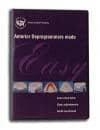2/12/07
A study has found that a new form of supplemental therapy that teaches patients pain-coping strategies can also lower costs of treatment for temporomandibular disorder (TMD).
The study, which was conducted at the University of Texas Southwestern Medical Center, Dallas, included 81 women and 20 men, ages 18 to 70, who were divided into two groups. One group received 6 weeks of early biopsychosocial intervention, while the other group received standard dental care.
The patients in the intervention group were taught about the mind-body relationship, the body’s reaction to stress, and relaxation in everyday settings. They were also taught about biofeedback.
One year later, the patients who had received the intervention reported reduced levels of pain and had improved coping abilities and better moods and emotions. Patients who had received standard dental care made many more visits to a physician for treatment of pain, the study found. They also reported more general anxiety and other disorders.
[National Women’s Health Information Center, January 9, 2007]








